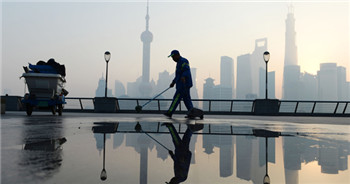(单词翻译:单击)

Living in Shanghai is like living in China — only less so. In many ways, it is the least Chinese of cities: English is widely (if often badly) spoken in many shops, restaurants and residential areas patronised by expatriates.
在上海生活感觉像是在中国生活——只是没那么像。在很多方面,上海都是最不像中国的城市:外国人出入的很多商店、餐厅和小区普遍说英语(尽管往往说得很糟糕)。
But Shanghai taxi drivers famously do not speak English (or understand the English names of even the most famous city hotels) and finding an English speaker outside expat areas can be tough. Overall, Shanghai packs a mean punch in terms of culture shock for anyone who is not Chinese — but less so than anywhere else on the mainland.
但是,上海的出租车司机以不会说英语(甚至听不懂该市最有名的酒店的英文名)而闻名,而在外籍人士聚集区以外很难找到说英语的人。总体上,在文化冲击方面,上海给境外人士一种不友好的碰撞感——但比内地其他地方要好些。
Exotic but not completely alien, modern but with a taste of the ancient, Shanghai attracts people from around the world who want to cash in on China’s economic boom — but without stepping too far outside their comfort zone. And that remains true today, despite theChinese economic slowdown that has given stock markets around the world jitters.
有异国情调但又不是完全不可理解,现代但又带有古韵,上海吸引着来自世界各地的人,他们想要在中国经济繁荣中分一杯羹——但又不想走出自己的舒适区太远。如今,尽管中国经济增长放缓给全球股市带来恐慌,但是上海的吸引力依旧。
Despite Beijing’s recent announcement that GDP growth could fall as low as 6.5 per cent next year, down from double digits as recently as 2010, there is little sign of a big exodus of expatriates from the mainland. In truth, China’s economy has been slowing steadily for several years as it matures, but for ambitious expatriate managers, it remains an important place to build a career.
尽管中国政府最近宣布明年的国内生产总值(GDP)增速可能降至6.5%(2010年时GDP增速仍达到两位数),但没有什么迹象显示大批外籍人士离开内地。事实上,随着经济日益成熟,中国经济增长逐渐放缓已有好几年,但是对于雄心勃勃的外籍经理人来说,中国仍然是成就事业的重要舞台。
InterNations, the global expat community, says China ranks third behind only the US and Malta, in its “job and career” rankings of expatriate life in 64 foreign countries. A remarkably low 3 per cent of expats surveyed in China said they regarded the state of the local economy negatively — compared with an average of 21 per cent who hold that view in other countries, InterNations said in its 2015 rankings released last month. But when it comes to “feeling welcome”, China sits at 61 out of 64 countries.
全球外籍雇员社区InterNations称,在其针对常驻64个国家的外籍雇员所作的“就业与职业发展”排行中,中国位列第三,仅次于美国和马耳他。InterNations在其10月份公布的2015年排名中表示,在接受调查的驻华外籍人士中,仅有3%的人称其对当地经济状态持负面观点——相比之下,其他国家持负面观点的外籍人士比例平均为21%。但是,在“感觉受欢迎程度”这一项上,中国在64个国家中排在第61位。
Still, there is no shortage of expats coming to Shanghai for work, local headhunters say, and figures for the number of residence permits issued to foreigners in Shanghai fell only slightly between 2013 and 2014 and remain 70 per cent up on a decade ago, at about 170,000.
话虽如此,当地猎头表示,上海并不缺少来此工作的外籍人士,同时从2013年至2014年,上海发放给外籍人士的居住证仅略有减少,但仍比10年前高出70%,为17万左右。
But local relocation companies, international schools and long-time expat business people say they see a marked change in the kind of expatriates who are moving to Shanghai. Fewer are coming on lavish corporate packages (as companies save money by localising senior positions) and more are coming on their own.
但是,当地的国际搬家公司、国际学校、以及长期在沪生活的外籍商界人士称,如今来到上海的外籍人士类型出现了显著变化。带着牛气的全套公司待遇来上海的人减少了(企业为了省钱从当地挑选高级职位人选),而自带行李到上海打拼的外国人增加了。
Overall, foreign resident numbers fell 3 per cent last year, but relocation company numbers and international school enrolment suggest a much steeper decline in executives heading to Shanghai on full expat packages. The headmaster of one of the leading Shanghai international schools says he sees a marked change in the racial composition of the school’s students, with many more Asian children and fewer Europeans, to the point where the school has had to offer English as a second language support to preschoolers for the first time.
总体而言,去年常驻的外籍人士数量减少3%,但从国际搬家公司和国际学校的数字看,带着全套待遇来上海的高管人数的降幅远高于此。上海一所领先的国际学校的校长称,他发现该校学生的族裔构成出现了明显变化,亚洲的孩子越来越多,而欧洲孩子越来越少,以至于该校不得不首次向学龄前儿童提供英语作为第二语言的辅导课程。
At a recent meeting sponsored by the American Chamber of Commerce in Shanghai, several managers of multinational corporations said that most executive positions in their corporations had been switched to local terms in recent years.
上海美国商会(American Chamber of Commerce in Shanghai)最近赞助举办的一个会议上,多名跨国公司的经理表示,其所在公司近年多数高管职位都转向本地寻找。
“The number of expatriates hasn’t fallen, but the composition of the expat population has changed. Many more expats are actually returning Chinese, and the western expat on a two-three-year contract is much scarcer than before,” says one expat service provider.
“外籍人士的数量没有减少,但是其构成发生了变化。更多外籍人士实际上是返回故乡的华裔,而拿到两、三年合同的西方外籍人士比过去少多了,”一家外籍人士服务提供商称。
Lawyers, who work on visa matters, say that although overall residence permit numbers have not fallen sharply, the statistics could be inflated by expats who were previously in the country illegally, but regularised their status after a recent crackdown.
经手签证事务的律师们表示,尽管向外籍人士发放的居住证数量总体并未急剧减少,但一些之前在中国非法居留、但在最近的整治行动后“转正”的外籍人士可能推高了统计数字。
Still, Shanghai’s reputation as a place to live is far from stellar. Shanghai did not even make it into the top 100 of the world’s most liveable cities, according to 2015 rankings from Mercer, the employment consultants.
尽管如此,按照宜居城市的标准来衡量,上海的声誉远非一流。根据就业咨询公司美世(Mercer)公布的2015年排行榜,上海甚至未能跻身前100座全球最宜居城市之列。
Many expats complain about traffic and pollution, food safety and internet speed. The stampede at the 2014 New Year’s Eve celebrations in which 36 people were trampled to death on the Shanghai Bund was a sombre reminder of the city’s crowds and chaos — and a lack of public civility that is extreme even by global megacity standards.
很多外籍人士抱怨这里的交通、污染、食品安全和网速。发生在2014年新年夜、造成36人死亡的上海外滩踩踏事件,不留情面地向世人提醒这座城市的拥挤和混乱,以及即使按照全球超大城市的标准衡量也极差的公共文明。


